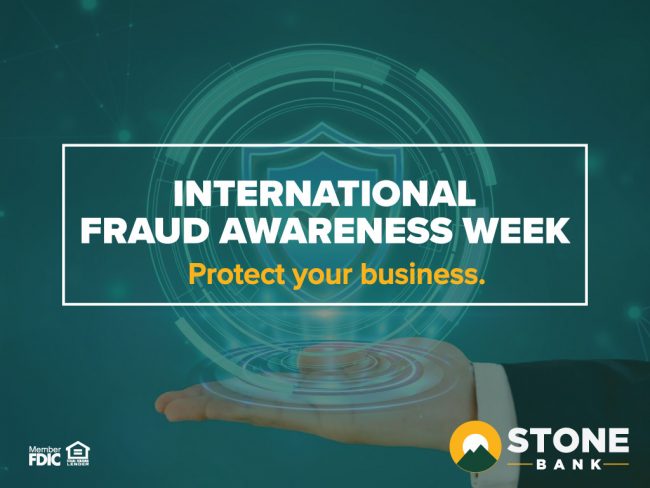Fraud can happen to anyone, and scammers are becoming more convincing every day. From fake texts and phishing emails to online scams and impersonation attempts, criminals are always looking for ways to trick people into sharing personal or financial information.
That’s why International Fraud Awareness Week is the perfect time to review how you can protect yourself and what Stone Bank is doing to help you stay safe.
What Is Fraud and Why It Matters
Fraud occurs when someone intentionally deceives another person for personal or financial gain. It can take many forms, from identity theft and online scams to fraudulent charges or fake bank communications.
Beyond the financial impact, fraud can also cause stress, anxiety, and lasting damage to your credit and peace of mind. At Stone Bank, we believe that awareness is your best defense.
How to Protect Your Personal and Financial Information
1. Be Wary of Unsolicited Requests
Legitimate organizations—like Stone Bank—will never call, text, or email you to ask for personal information, such as your account number, Social Security number, debit card PIN, or online banking password.
If you receive a message like that, do not respond, and contact your local Stone Bank branch directly to confirm.
2. Avoid Clicking Suspicious Links
Fraudsters often send emails or texts that look official, complete with logos and “urgent” language. Don’t click links or open attachments from unknown senders—these can lead to fake websites or install malware.
3. Don’t Trust Caller ID
Scammers can make their phone number look like it’s coming from your bank or a government agency. If something feels off, hang up and call the bank directly using a verified number from your statement or our website.
4. Use Secure Online Practices
Before entering payment information online, look for “https” in the web address and a padlock icon. Secure your home Wi-Fi with a strong password, and always use unique, complex passwords for online accounts.
5. Shred Sensitive Documents
Old bills, statements, and mail with personal details can be a goldmine for identity thieves. Shred them before throwing them away.
Be Skeptical of “Too Good to Be True” Offers
Scammers know how to use excitement or urgency to make people act quickly. Protect yourself by remembering:
- Easy money isn’t real: If it promises high returns with no risk, it’s a scam.
- Be cautious with free trials: They can lead to costly, recurring charges.
- Take your time: Don’t let anyone pressure you to act right away.
Use Secure Payment and Monitoring Methods
- Avoid risky payments: Never send money via wire transfer, gift cards, or cryptocurrency to someone you don’t know.
- Monitor your accounts: Regularly check your bank and credit card statements for unfamiliar charges.
- Check your credit report: Review your report from all three credit bureaus annually for suspicious activity.
- Consider a credit freeze: This can prevent new accounts from being opened in your name.
If You Think You’ve Been Targeted
- Stop all communication immediately.
- Contact your bank right away. Stone Bank can help you secure your accounts and take the next steps.
- Report it to the authorities. File a report with law enforcement or the Federal Trade Commission (FTC).
- Talk to someone you trust. Don’t face it alone—scams often thrive in secrecy.
How to Identify a Scam Posing as Stone Bank
Unfortunately, scammers sometimes impersonate trusted institutions. Here’s what Stone Bank will never do:
- Ask for your Social Security number, debit card number, PIN, or online banking password via phone, text, or email.
- Request payment through gift cards, wire transfers, or cryptocurrency.
- Send threatening messages claiming your account will be “locked” unless you act immediately.
- Ask you to download software or provide remote access to your device.
If you ever receive suspicious communication claiming to be from Stone Bank—do not respond. Contact your local branch or call (833) 253-2265 to verify.
Stone Bank: Your Partner in Fraud Prevention
Fraud prevention isn’t just a one-week effort. It’s an ongoing partnership between you and your bank. By staying alert, protecting your information, and reporting suspicious activity, you can help stop fraud before it starts.
Visit FraudWeek.com for more resources, and join Stone Bank in standing strong against fraud.
This information is for general education purposes only and not to be used as tax or legal advice. The opinions and recommendations expressed herein are those of the author(s) and not necessarily those of Stone Bank. Stone Bank’s website may contain links to websites of other organizations that are no longer protected by our privacy policy or security practices. Stone Bank nor any of their employees assume any legal liability for the accuracy, completeness, or usefulness of this information.

